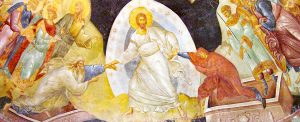Acts 2:1-11 • John 7:37-52; 8:12
When the Most High came down and confused the tongues, he divided the nations.
But when he distributed the tongues of fire, he called all to unity.
Therefore with one voice we glorify the all-Holy Spirit. (Kontakion for Pentecost)
Glory to God the Father, to the Son, and to the Holy Spirit. Amen.
Today on the Church calendar is the feast of Pentecost, commemorating the coming of the Holy Spirit on the Church at Jerusalem following the ascension of Christ. In the Jewish law, seven weeks after Pascha was the Festival of Weeks (Exodus 34:22), also named the Feast of Firstfruits (Numbers 28:26); in Greek it was called the Fiftieth Day: Pentēkostḗ.
Pentecost in the Old Testament was “the feast of the harvest, the first-fruits of your labors” (Exodus 23:16). Seven weeks from the day after Pascha, was time to offer to the Lord the firstfruits of the harvest (Leviticus 23:15-22; Deuteronomy 16:10-12; Numbers 28:26-30). This was one of the three feasts on which all Israelite men were to make a pilgrimage to the temple at Jerusalem if they could.
In Acts chapter 2, it’s on this day – when first fruits are offered to the Lord – that the firstfruits from the nations are brought in to the Kingdom:
‘How is it that each of us hears them in our native language… We hear them declaring the wonders of God in our own tongues!’ …Then those who gladly received his word were baptized; and that day about three thousand souls were added to them.
Of course the miracle at Pentecost is not a hundred and twenty men speaking unknown languages. They’re speaking languages that the entire crowd in downtown Jerusalem can understand. Men and women from every nation on earth, both ethnic Jews and converts, are hearing in their own heart’s language the Gospel of the Kingdom. Not in the everyday Greek or Aramaic that were spoken everywhere, and not in the liturgical language of Hebrew. But in the language they knew and spoke to their family in.
Do you remember Genesis 11? The Babylonians are building a tower. Not exactly “to reach heaven,” but literally “its top with the heavens,” ornamented with astrological symbols and idols. Ziggurats, the Babylonian version of pyramids, were astrological observatories and places of unclean sacrifice and divination, the worship of false gods, “the hosts of heaven.” So the Lord judges this abomination. He breaks their singleness of purpose by dividing their languages.
One moral of the story for us is that pride results in division, and ego makes us incapable of understanding one another, because communication requires humility. “God resists the proud, but gives grace to the humble.” (1 Peter 5:5-6; James 4:6-7) Also: Don’t build really, really tall buildings.
Throughout the Old Testament, prophets predict the coming divine judgments, the invasions that will destroy and scatter the kingdom of Israel. And in the prophets, whenever we hear about foreign languages and people of stuttering tongues, it’s in the context of God’s judgment for sin.
The Israelites were given the task of keeping their tradition free from mixture: No foreign gods, no foreign wives. The Law of Moses taught them in every way to preserve purity and separation. Don’t plant two crops in one field; don’t sew a garment of two different fabrics. And for goodness sake don’t let your sons marry idolatrous foreign women who will bring their false gods with them. Throughout the Old Testament we see so many times when that command was disobeyed, and the results were exactly as predicted. God teaches Israel to see the multitude of foreign nations and languages as a flood that will obliterate them if they let it in.
No wonder the Gospel is such a scandal!
In today’s Kontakion we sang: “When the Most High came down and confused the tongues, he divided the nations…” Everybody in Israel nods and says amen.
“…But when he distributed the tongues of fire, he called all to unity.” Whoa there! You want to let just anybody become part of the People of God? (Well, it’s funny you should mention…)
In Acts 15 we see that scandal in action. Some people start teaching that the gentile Christians in Syria need to start obeying the Jewish law. By the end of the chapter, we’ve seen what is really the first Ecumenical Council. (Isn’t that the reason we celebrated the Council of Nicea last week? To give us context for what it looks like when shepherds full of the Holy Spirit and wisdom can say with inspiration and authority: It seems good to the Holy Spirit and to us to give you this instruction.”)
“When he distributed the tongues of fire, he called all to unity.” There’s something interesting about the Gospel that the Apostles preached that day. We don’t sing, “He called all to have their needs met.” When the Apostles preach the Gospel, they don’t promise that Jesus is a useful product you can add to your life to improve it. They don’t preach that God plans to mobilize a movement to fix all that’s wrong in society.
The miracle at Pentecost has its beginnings in Moses’ time. We heard the story last night at Vespers: Moses was overwhelmed with administration, and cried out to the Lord, “I can’t carry all these people! The burden is too heavy for me!” So the Lord told him to gather 70 elders from the people at the Tabernacle. “I will take of the Spirit upon you and put Him upon them; and they shall help you.” The elders gathered, and “when the Spirit rested upon them, they prophesied.” Two of the 70 elders remained in the camp and did not come out – but the Spirit came down on them anyway and they prophesied where they were. Someone ran to Moses, “These two guys are prophesying in the camp! Make them stop!” Moses’s answer: “Are you jealous for my sake? Would that all the Lord’s people were prophets and that the Lord would put his Spirit on them!” (Numbers 11).
Moses, today you get your wish.
And it shall come to pass in the last days, says God, that I will pour out of My Spirit on all flesh; your sons and daughters shall prophesy, your young men shall see visions, your old men shall dream dreams. And on My servants and handmaids I will pour out My Spirit in those days; and they shall prophesy. (Joel 2:17-18).
What does it mean to prophesy? In the Hebrew Bible, two words are used to describe the prophet. The earlier of the two is the word ro’eh, which means, “one who sees”. Later, the more common word used for a prophet is nabi, which means “one who speaks” – particularly, on behalf of another.
From Greek we get two words that overlap in meaning: Prophet, which means one who speaks before others; and Martyr, which means witness, one who tells what he has seen firsthand.
“You will be baptized with the Holy Spirit not many days from now… you will receive power when the Holy Spirit has come upon you; and you will be witnesses to Me in Jerusalem, and in all Judea and Samaria, and to the end of the earth” (Acts 1:5, 8).
Before the resurrection, the Lord said, “While I am in the world, I am the light of the world” (John 9:5, 8:12). But he spoke of the Church’s prophetic role when he said,
You are the light of the world. A city that is set on a hill cannot be hidden. Nor do they light a lamp and put it under a basket, but on a lampstand, and it gives light to all who are in the house. Let your light so shine before men, that they may see your good works and glorify your Father in heaven (Matthew 5:14-16).
A city on a hill is where we started, with the confusion of languages at Babylon. We’ve come full circle. Now here is what the city of God looks like when it’s established firmly in the Lord:
They continued steadfastly in the apostles’ doctrine and fellowship, in the breaking of bread, and in the prayers… So continuing daily with one accord in the temple, and breaking bread from house to house, they ate their food with gladness and simplicity of heart, praising God and having favor with all the people. And the Lord added to the church daily those who were being saved (Acts 2:42, 46-47).
Psalm 132 (lxx) describes the life of the Spirit in the people of God:
Behold, how good and how pleasant it is for brethren to dwell together in unity! It is like the anointing oil on the head, running down on the beard of Aaron, running down to the hem of his garments. It is like the dew of Hermon descending upon the mountains of Sion; For there the Lord commanded the blessing: Life forevermore.
By your prayers may our parish community and the Church in the whole world be conformed to that image.
* * *
In today’s Gospel, the Lord stood in the Temple and cried out,
“If anyone is thirsty, let him come to Me and drink. He who believes in Me, as the Scripture has said, out of his heart will flow rivers of living water.” But this He spoke concerning the Spirit, whom those believing in Him would receive; for the Holy Spirit was not yet given, because Jesus was not yet glorified (John 7:37-39).
This is what the Lord told the Samaritan woman – “whoever drinks of the water that I shall give him will never thirst. But the water that I shall give him will become in him a fountain of water springing up into everlasting life.” (John 4:13).
You know, Christ did not mean “Anyone who ever tastes the Holy Spirit once is done now, and never needs another drink.” He meant that there is a never-ending fountain of life, and the one who becomes a communicant of that life never needs to go thirsty again.
So why are we not filled with living water and overflowing with grace all the time? The Psalmist confesses,
As the deer longs for fountains of water, so my soul pants for You, O God. My soul thirsts for God, for the living God. When shall I come and see the face of God? My tears have been my bread by day and by night, while they continually say to me, “Where is your God?” (Psalm 41:1-3 lxx)
It’s true that we who have received the living waters of the Holy Spirit in our baptism and chrismation do not always live like people in the mainstream of the Life of God.
In fact, God never planned that we would receive the Holy Spirit once, and that’s it. Many times in the book of Acts, after Pentecost, Saint Luke writes that the disciples and apostles were again and again “filled with the Holy Spirit” (Acts 4:8; 4:31; 9:17; 13:9; 13:52).
When Saint Paul says, “And be not drunk with wine, wherein is excess; but be filled with the Spirit” (Ephesians 5:18), that’s a continuous verb: Be being filled.
And Saint John Chrysostom says, “We must manifest the desire of thirsty men; for ‘blessed are those who hunger and thirst for righteousness’” (Matthew 5:6; Homilies on John, LI, 1)
We need to stay thirsty. At the beginning of the pre-Lenten period, we began singing in Matins the song of the exiles in Babylon: “By the waters of Babylon we sat down and wept when we remembered you, O Sion… If I forget you, O Jerusalem, let my right hand forget its skill. If I do not remember you, let my tongue cling to the roof of my mouth” (Psalm 136 lxx)
We sang this lament in order to cultivate a longing for Paradise, mankind’s natural habitat, from which we are alienated by our sins.
And now, celebrating the outpouring of the Holy Spirit, we pray with David, “O God, thou art my God; early will I seek thee: my soul thirsts for thee, my flesh longs for thee in a dry and thirsty and unwatered land” (Psalm 62:1 lxx)
When we don’t sense any lack, or distance between us and God, when everything seems fine – that’s when we need to be intentional about prayer. “Early will I seek thee.” We need to practice staying thirsty.
When we read the lives of the saints, we see what the power and life of God can do in a person who cooperates with Grace. And we can begin to be a little dissatisfied, a little bit desirous to be used by God in a similar way. A little envious of the purity of heart that gives them such bold and joyful access to God. This is a profitable and virtuous use of eros; allow others’ virtue and discipline to provoke you to love and good works (Hebrews 10:24) as well. Stay thirsty.
* * *
What did Pentecost change?
First of all, After the crucifixion of the Lord, the apostles were hiding out behind locked doors for fear of the Jews. Peter denied he even knew who Christ was, for fear of being arrested too. But when the Holy Spirit filled the apostles with power, Peter and the others stood up in Downtown Jerusalem and preached boldly: “You bet I know Jesus! You killed him! The Father raised him! Now he is enthroned as King and you need to be baptized into his Kingdom!”
Second: In the Garden, Christ told his disciples, “I still have many things to say to you, but you cannot bear them now. But, when the Spirit of truth comes, He will guide you into all truth” (John 16:12-13).
Even after three years being personally taught by God the Word, there were truths that the disciples were not going to be able to grasp and act on, until they were enlightened by the Holy Spirit. “The natural man receiveth not the things of the Spirit of God: for they are foolishness to him: neither can he know them, because they are spiritually discerned” (1 Corinthians 2:14).
But after Pentecost, Saint Paul says,
Eye hath not seen, nor ear heard, neither have entered into the heart of man, the things which God hath prepared for those who love him. But God hath revealed them unto us by his Spirit… Now we have received, not the spirit of the world, but the spirit of God; that we might know the things that are freely given to us by God (1 Corinthians 2:9-10, 12).
The disciples, having received the Holy Spirit, now have the ability by grace to hear and put into action the mysteries that the naturally-minded man cannot receive.
And finally: Before Pentecost, the Eleven are concerned about bringing their number back up to twelve. Their plan? They pick two men and ask, “O Lord, you know the hearts of all, show which of these two you have chosen” (Acts 1:24), and then they “cast lots.” Not sure just how that was done: They might have drawn straws, or maybe they flipped a coin for it. Such was their deep, mystical method of knowing God’s will.
But after Pentecost, the Apostles now have the discernment and confidence to say, in Acts 15, “It seemed good to the Holy Spirit and to us, to lay upon you no greater burden than these necessary things.” By divine grace, the Holy Spirit now guides the hierarchs and archpastors, and the whole Church, into all truth, as Christ promised.
Boldness, spiritual illumination, and the grace of divine wisdom and authority — these are not only for the apostles and their successors, nor for a few select saints: These are attributes of the Church, beginning at Pentecost.
* * *
One last observation: The Church, with understanding, boldness, and authority, speaks as a witness to the truth and acts prophetically in the world.
But activism is not the same thing as being prophetic. When the Church cares for the poor or feeds the hungry or speaks up for the marginalized, it is not for the same reason an activist does. They might both support or oppose the same causes, but the Christian is motivated by something different. The Christian is not in this, ultimately, to improve society or fix the system. A Christian is moved to speak as a witness to the Kingdom of God and act prophetically because he or she has seen a different future. Remember: a prophet says a different word because he sees a different world.
Every time the Church welcomes the stranger, forgives an enemy, shows mercy to the offender, or protects the vulnerable, we are bearing witness to the law of Christ’s Kingdom. We don’t do these things to be a humanitarian or to solve a global crisis. We do it because we live today in the Kingdom of God, and we testify to the Day when the Kingdom will come in fullness, on earth as it is in heaven, when every tear will be wiped away, when suffering is no more. When Christ will be all and in all.
To the glory of God the Father, the Son, and the Holy Spirit.






